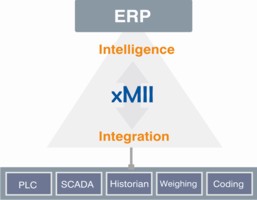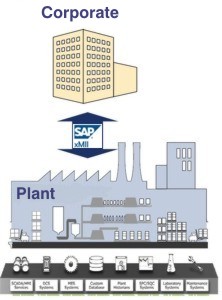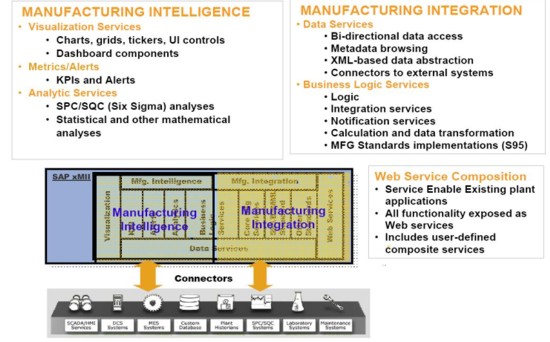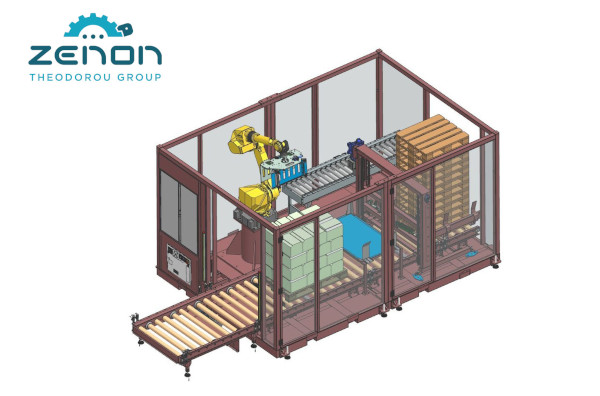
SAP MII – Platform for Manufacturing Integration & Intelligence
What is SAP MII?
SAP MII (Manufacturing Integration and Intelligence) is a platform that helps manufacturers connect their business operations to the factory floor in real-time. SAP MII interfaces with your existing ERP and other shop-floor applications delivering ‘intelligence’ to production personnel.
SAP MII delivers:
• Manufacturing Integration: A single ISA-95-compliant layer enabling SAP ERP connectivity into real-time plant floor apps (MES, SCADA, legacy apps.) to drive plant-to-Manufacturing Intelligence enterprise business process inter-operability.
• Manufacturing Intelligence: A real-time analytics engine that aggregates and delivers unified visualization of events, alerts, KPIs, and decision support to production personnel through role-based dashboards.

What does SAP MII have to offer to a manufacturing company?
Manufacturers today operate in highly complex and distributed environments, facing unprecedented pressures to cut operating costs, deliver on time and optimize use of available assets, while complying with regulatory and customer requirements.
 Addressing these challenges requires seamless integration and synchronization between the supply chain and production operations. In most enterprises though, connectivity of ERP and shop-floor systems is implemented only through manual batch data entry. But what manufacturers need is real-time data acquisition and analysis in order to support decision making. This requires visibility into all aspects of production operations in the context of every role (production manager, technical manager, etc).
Addressing these challenges requires seamless integration and synchronization between the supply chain and production operations. In most enterprises though, connectivity of ERP and shop-floor systems is implemented only through manual batch data entry. But what manufacturers need is real-time data acquisition and analysis in order to support decision making. This requires visibility into all aspects of production operations in the context of every role (production manager, technical manager, etc).
SAP MII acts as a bridge between business and shop-floor systems, delivering real-time production information regarding production orders, materials, inventory, equipment, production costs, product quality, traceability, etc. SAP MII helps manufacturing companies respond quickly to unplanned events (customer requests, materials shortages, equipment failure, product recalls, etc).
What kind of system is SAP MII?
SAP MII is not an ERP. By contrast, it is a manufacturing platform. By seamlessly communicating with your ERP, SAP MII enables shop-floor and supply chain synchronization. SAP MII complies to ISA-95 and B2MML, the industry standards for business-to-manufacturing integration.
SAP MII will not replace your existing IT infrastructure. It will leverage and flexibly integrate it with shop floor systems (MES, SCADA, Historian, PLCs, etc) in order to build a unified picture of manufacturing operations. SAP MII achieves this with specialized and easily customizable connectors (OPC, ODBC, etc).
SAP MII Architecture

SAP MII Functionalities


Production Monitoring and Product Traceability System
What is Tracer Factory?

Tracer Factory is an MES (Manufacturing Execution System) especially designed to meet traceability requirements of manufacturing companies. It is a scalable and easy-to-install and operate system and has been successfully applied in every industrial sector.
Basic Functions
- Item / Carton / Pallet coding and labeling
- Track & Trace
- Scheduling
- Performance Measurement
- Knowledge Management
- Exceptions Management
 Connectivity
Connectivity
Why Tracer Factory?
Comply with EU regulations and laws
Tracer Factory fully complies with European regulations 178/2002 (food safety and traceability) and 1935/2004 (packaging materials traceability).
Meet customer requirements
Tracer Factory helps you respond quickly in the case of a defective product or material and provides reliable information to customers and suppliers.
Improve productivity
With Tracer Factory, you can…
- Reduce paperwork and prevent human errors.
- Reduce costs through targeted recalls at the LOT level.
- Gain real-time visibility at inventory levels and positions.
- Efficiently manage your resources for optimal production scheduling.
- Support your decisions through real-time access to production data.
- Reduce receiving and dispatching times.
- Respond quickly to urgent customer requests and production exceptions.
Risk Management
With Tracer Factory, you can…
- Protect your corporate and brands reputation.
- Effectively manage production exceptions (product recalls, urgent customer requests, etc).
- Support your enterprise’s claims on product safety.
- Comply with European regulations for traceability.
- Combat counterfeiting.
Competitive Advantages
Tracer Factory…
- Is developed by Theodorou Automation, a company with more than 20 years of experience in industrial coding.
- Has been successfully applied in all kinds of manufacturing companies, regardless of sector and scale.
- Is designed based on usability standards, being user-friendly and intuitive both to the management and operators.
- Is harmonically integrated with your existing systems.
- Provides reliable real-time information about “what really happened on the shop-floor”.
Successful Installations
Theodorou Automation has successfully installed Tracer Factory in many Greek Food & Beverage manufacturing companies including Oil & Fats, Tomato, Sea Food, Animal Feeds, Bakery products, Agricultural products, etc.
Considering the internal (productivity, error and cost reduction) and external (regulations, customers) requirements met by a Tracer Factory implementation, ROI is less than one year.

Integrated Suite of Solutions for the Management of Manufacturing Operations.
What is iFactory?
iFactory is an integrated set of tools and applications, enabling:
• Decision support based on reliable data collected in real-time from the factory floor
• Synchronization between business and shop floor systems
• Asset utilization, productivity improvement and cost reduction
• Compliance with European regulations for product safety, quality and traceability
• Quick response to unplanned events
What are the basic functions of iFactory?
• Execution & Traceability: Execution and monitoring of production processes in real-time.
• Asset Utilization: Real-time ΟΕΕ (Overall Equipment Effectiveness) measurement.
• Integration: Harmonization of information flow between business systems (ERP, WMS, SCM, etc) and automation & control systems (MES, SCADA, etc).
• Intelligence: Real-time data collection, analysis and visualization in the context of every different role.
What systems does iFactory include?
| Tracer Factory | |
| Tracer Factory: MES (Manufacturing Execution System) for production monitoring and product traceability, including modules such as: • Coding & Labeling • Track & Trace • Production Scheduling • Data Acquisition • Receiving/Dispatch Units Management • Recall Management |
|

 Manufacturing Operations Management (or Production Management) refers to the integrated set of functions that enables the optimization of production activities within a manufacturing company. Such operations include raw materials management, production scheduling, quality controls, product tracking and genealogy, warehouse management, intermediates management, dispatch units management, data acquisition, asset management, etc.
Manufacturing Operations Management (or Production Management) refers to the integrated set of functions that enables the optimization of production activities within a manufacturing company. Such operations include raw materials management, production scheduling, quality controls, product tracking and genealogy, warehouse management, intermediates management, dispatch units management, data acquisition, asset management, etc.What does a Manufacturing Operations Management System offer to a manufacturing company?
Theodorou Automation SAICT develops and promotes the following Manufacturing Operations Management Systems:
| • iFactory: Integrated suite of solutions for the management of production processes, consisting of the following systems: | |
| • Tracer Factory: MES (Manufacturing Execution System) for production monitoring and product traceability. |

Just-in-time production processes, smaller stock holding levels and computerized stock control systems, are placing pressure on manufacturers to apply unique identification labels on products, in retail outlets or for logistical purposes.
From printing and applying small bar code labels onto blister packs, through to pallet labeling using A5 labels, there is a unit to suit every possible requirement.
In common with all HERMA systems, print & apply solutions are based upon a comprehensive range of tried and tested state-of-the-art-modules. A wide spectrum of printers and application units dovetail together to provide the perfect solution for even the most demanding of requirements.
Watch this video to see how a hybrid system with HERMA labeler and integrated thermal printer works:
The advantages of Herma labelers at a glance:
- Control integrated into the applicator – no separate control box is required
- Clearly laid out operating display
- Wide range power input 100V AC … 240V AC ±10%, 50 Hz … 60 Hz
- Automatic synchronization of labelling and product speeds
- Comprehensive range of modules: pedestals, label sensors, printing and embossing units – always a perfect fit
- Special unwind unit giving consistent web tension
- Available as left-hand and right-hand versions, for upright, horizontal or suspended operation, width in increments of 80 mm / 3” up to 320 mm / 12”
- PLC connection – no problem at all
- Transparent labels – no problem at all
- Easy to expand
- Integrate most popular coders /printers
Events
Give us your Feedback
What would you like to see in a future event? Which sector should be included in our next Coding & Traceability Technology Day? Send us your suggestions by submitting this Contact Form or call us at 0030 2106690900.



